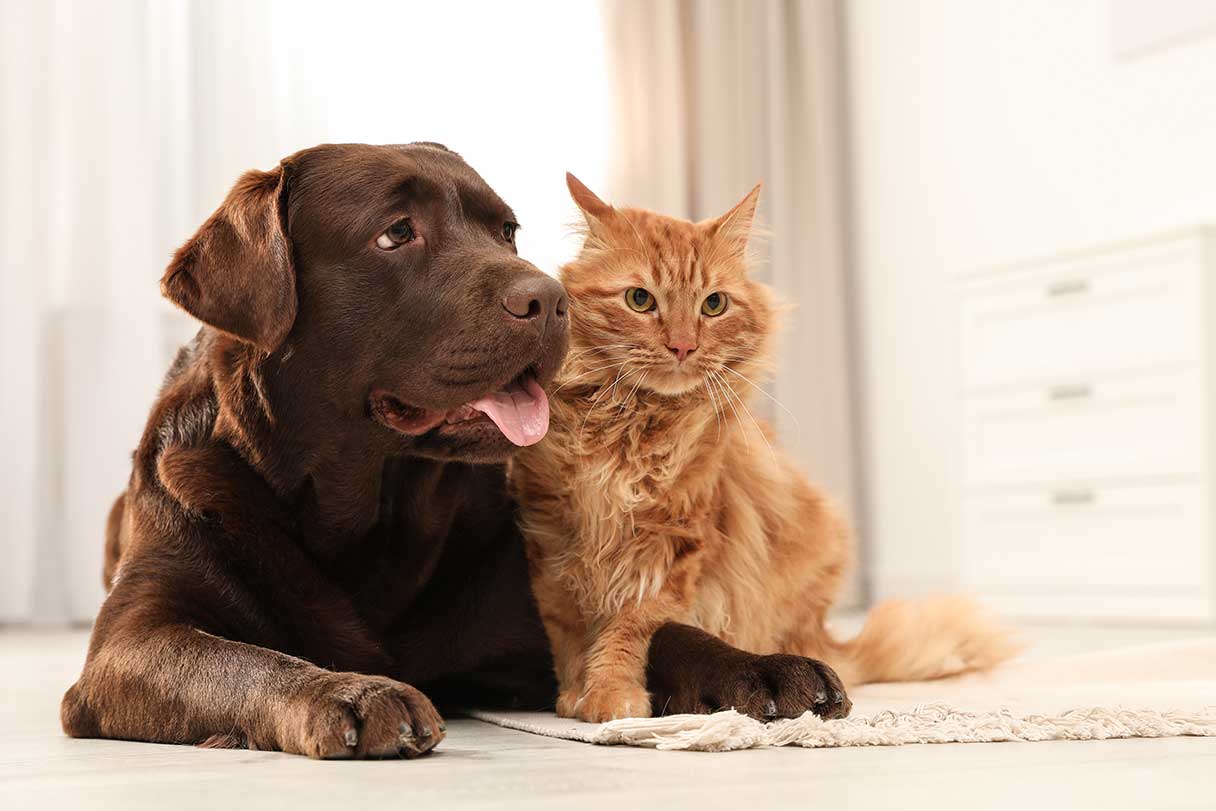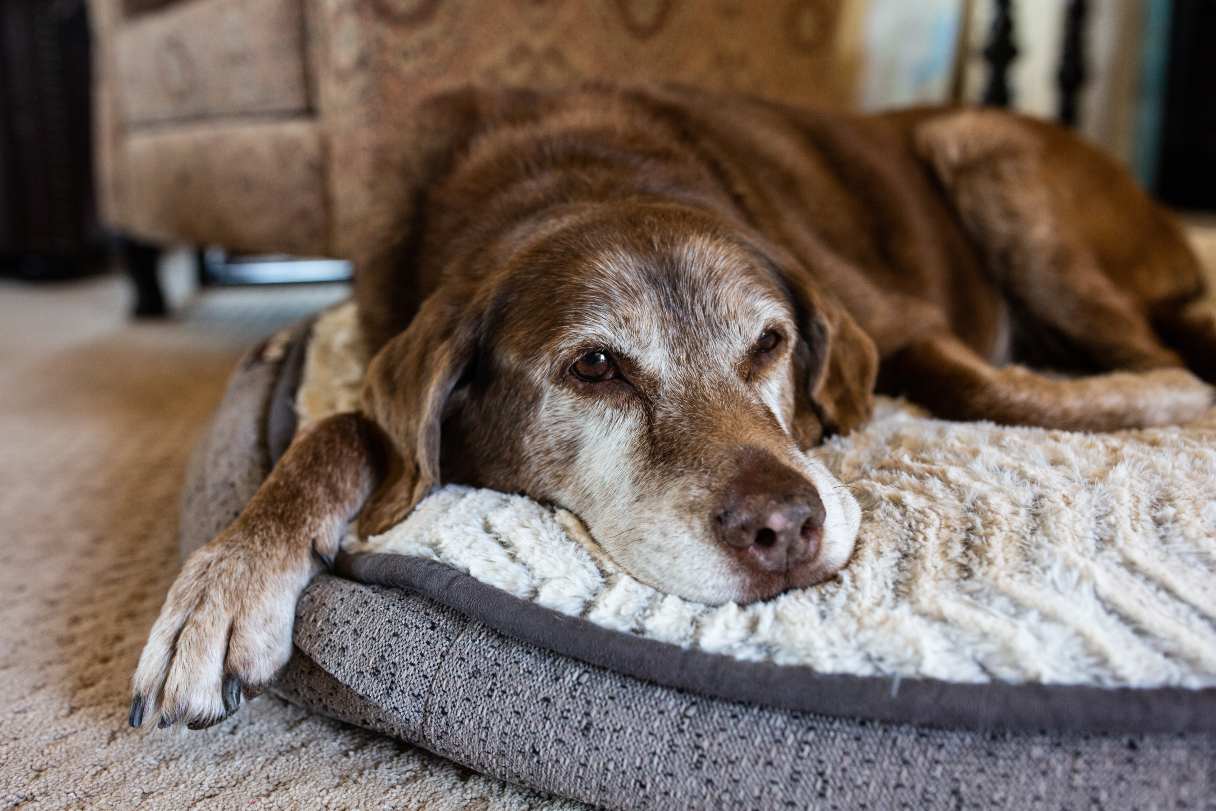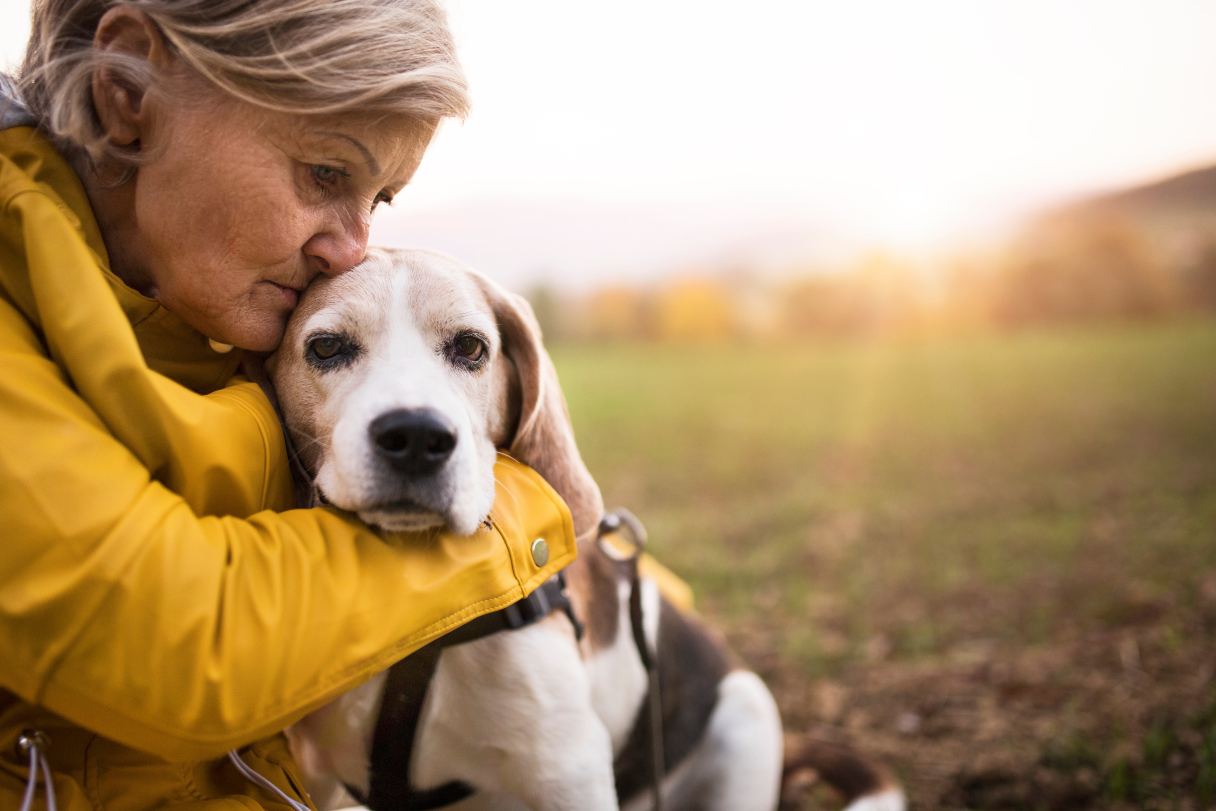One of the last things you want to hear is that your beloved dog or cat has cancer. But considering that almost 50% of dogs over the age of 10 will get some type of cancer,1 as will 30% to 40% of all cats,2 there’s a good chance you’ll have this conversation with your veterinarian. While less is known about the cancer rate of cats, advances in diagnosis, treatment and care give pets today a much better outlook than in the past, especially if the disease is caught early.1
Each cancer treatment is unique to the pet and the type of cancer being treated. Options to treat cancer in pets typically include surgery, chemotherapy, radiation therapy and immunotherapy.1
In this article, we’ll dive specifically into chemotherapy, including how much chemotherapy costs for dogs or cats and financing options that can help you pay for this often-costly treatment.
What Is Chemotherapy Treatment for Dogs and Cats?
Chemotherapy (chemo) involves treating your pet with drugs containing chemicals that destroy cancer cells.3 Chemo is often combined with other treatments, such as surgery, radiation therapy or immunotherapy.4 This treatment option may be given in the form of a pill, an injection or an IV drip and is usually administered by a veterinarian at their office.4
Some cancers respond to chemo better than others, so whether your vet recommends chemo will largely depend on the type of cancer you're dealing with.4 In some cases, your veterinarian may refer your pet to a board-certified oncologist or specialty clinic.1
A high priority with chemotherapy is to provide your pet with the best possible quality of life, so your veterinarian can help you determine an effective plan for your pet based on their diagnosis and age.4 For many pets, cancer can be lethal, but not always, and chemotherapy can help extend the amount of time they have left, regardless of age. The best chance of success is through early detection.1
Common cancers in dogs
Common cancers in dogs that may require chemotherapy treatment include:5
- Lymphoma
- Bone cancer
- Mast cell tumors
- Soft tissue sarcomas
- Oral cavity tumors
- Nasal tumors
Common cancers in cats
Common cancers in cats that could require chemotherapy treatment are:5
- Gastrointestinal lymphoma
- Squamous cell carcinoma
- Mammary cancer2
- Fibrosarcoma6
How Much Is Chemotherapy Treatment for Dogs and Cats?
Because each chemotherapy treatment is unique to the pet, the cost of chemotherapy for dogs and cats varies.
The national average cost* of therapy specifically for dogs diagnosed with lymphoma is $5,254, while the average cost* to treat a cat diagnosed with lymphoma starts at $4,269. 7
The table below lists the average costs* of cancer therapy for dogs and cats diagnosed with lymphoma:7
| State/District | Average cost (cat) | Average cost (dog) |
|---|---|---|
| Alabama | $3,597 | $4,413 |
| Alaska | $5,091 | $6,240 |
| Arizona | $4,425 | $5,426 |
| Arkansas | $3,548 | $4,364 |
| California | $5,700 | $7,019 |
| Colorado | $4,304 | $5,343 |
| Connecticut | $4,590 | $5,657 |
| Delaware | $4,201 | $5,128 |
| District of Columbia | $5,776 | $7,104 |
| Florida | $4,203 | $5,176 |
| Georgia | $3,727 | $4,617 |
| Hawaii | $7,655 | $9,387 |
| Idaho | $4,174 | $5,117 |
| Illinois | $3,866 | $4,749 |
| Indiana | $3,705 | $4,567 |
| Iowa | $3,664 | $4,507 |
| Kansas | $3,561 | $4,347 |
| Kentucky | $3,794 | $4,683 |
| Louisiana | $3,776 | $4,672 |
| Maine | $4,474 | $5,497 |
| Maryland | $4,734 | $5,838 |
| Massachusetts | $5,950 | $7,335 |
| Michigan | $3,696 | $4,573 |
| Minnesota | $3,910 | $4,826 |
| Mississippi | $3,400 | $4,220 |
| Missouri | $3,628 | $4,468 |
| Montana | $4,223 | $5,205 |
| Nebraska | $3,821 | $4,721 |
| Nevada | $4,147 | $5,112 |
| New Hampshire | $4,617 | $5,646 |
| New Jersey | $4,675 | $5,750 |
| New Mexico | $3,816 | $4,705 |
| New York | $5,047 | $6,212 |
| North Carolina | $4,031 | $4,936 |
| North Dakota | $3,767 | $4,611 |
| Ohio | $3,843 | $4,760 |
| Oklahoma | $3,503 | $4,287 |
| Oregon | $4,546 | $5,624 |
| Pennsylvania | $3,892 | $4,798 |
| Rhode Island | $4,617 | $5,673 |
| South Carolina | $3,933 | $4,804 |
| South Dakota | $3,781 | $4,650 |
| Tennessee | $3,727 | $4,551 |
| Texas | $3,779 | $4,663 |
| Utah | $4,237 | $5,227 |
| Vermont | $4,693 | $5,789 |
| Virginia | $4,134 | $5,090 |
| Washington | $4,680 | $5,761 |
| West Virginia | $3,441 | $4,231 |
| Wisconsin | $3,951 | $4,886 |
| Wyoming | $3,901 | $4,798 |
Initial consultation fees with an oncologist can range from $125 to $250 depending on the hospital and geographic location.8 The average cost of chemo for dogs and cats can range from $150 to $600 per dose.8 Radiation, if necessary, can cost $1,000 to $1,800 for a palliative protocol and $4,500 to $6,000 for a curative intent protocol.8 The total cost of chemo can range from $3,000 to $10,000 or more over several months of treatment.4
Other factors that will impact the overall cost of dog or cat cancer treatment include the type of cancer, the location of the tumor, the size of your pet, the range of time over which chemo is administered and how well your pet responds to treatment. Surgical removal can add several hundred dollars to the cost, typically costing around $500 and up depending on whether the tumor is in a hard-to-reach location, the extent of the surgery involved and your pet's recovery period. CT scans and other types of monitoring, if needed, can also add to the total treatment cost.9
Does Pet Insurance Cover Chemotherapy Treatment for Dogs and Cats?
Many pet insurance companies cover the cost of cancer treatment. Coverage may depend on several factors, such as the type of policy you purchase, the size of your deductible and any preexisting conditions your pet may have. Sometimes cancer coverage must be added on and purchased separately.8
If your pet insurance doesn't cover the cost or you do not have pet insurance, you can expect to pay the full amount which, again, can run anywhere from a few thousand dollars to more than $10,000.4
Also, keep in mind that even with pet insurance, you would pay your vet up front and then submit a claim to your insurer for reimbursement. So, while pet insurance can provide immense financial relief in the event your pet ever needs cancer treatment, you'll still need a way to pay up front for vet visits and treatments.
If you don’t have pet insurance, ask your veterinarian if they offer funds for people who need financial assistance. Some foundations and nonprofit organizations provide assistance or grants to individuals and families in need to help cover the cost of expensive veterinary treatments.10
How Chemotherapy Treatment Works for Pets
How chemotherapy works depends on the kind of treatment your pet receives. A pill is easy enough for your pet to swallow, and an injection-based chemotherapy treatment can also be administered by your veterinarian in-office. But your pet may need to stay at the clinic or hospital for more intensive treatments, like an IV infusion.11
Treatment may last a few months, a lifetime or be sporadic based on your pet’s needs. If the cancer goes into remission, your veterinarian may end treatment altogether.11
Potential risks and side effects
Although side effects may occur with chemotherapy, they're generally not comparable in severity to those experienced by humans going through chemo.4 These are the most common side effects your dog or cat might experience on chemotherapy:11
- Reduced appetite
- Nausea
- Vomiting
- Diarrhea
- Lethargy
Generally, these side effects are mild and clear up on their own.11 However, your vet may need to treat severe reactions, and if side effects negatively impact your pet's quality of life, your vet may alter their regimen by changing the dosage or eliminating certain drugs.8
Caring for your pet during chemotherapy treatment
The best thing you can do while your pet is going through chemotherapy is to ensure they are getting enough food and their basic nutritional needs are being met. There is limited information about the ideal nutrition profile for pets with cancer, so it’s not recommended to drastically change their diet.12
There is also little research about the efficacy of supplements for pets with cancer, but here are some that may be helpful both with treatment and managing the side effects:12
- Omega-3 fatty acids have anti-inflammatory properties.
- Turkey tail mushroom (Coriolus versicolor) may inhibit cancer cell growth and improve long-term survival when combined with other treatments.
- Yunnan Baiyao may reduce the risk of bleeding from hemangiosarcoma.
- Probiotics help the digestive tract and improve diarrhea.
- Curcumin may inhibit cancer cell growth.
- SAMe and milk thistle can help treat and manage liver toxicity, a common side effect of chemotherapy.
Chemotherapy Recovery Tips for Your Dog or Cat
After your pet receives chemotherapy, it's important to carefully monitor them for two to five days for abnormal behavior or side effects. As long as your pet is eating, drinking and moving around fairly well, many of the mild side effects mentioned above can be managed at home.13
You can offer your pet a small amount of food or water, but be sure to not overfeed or overwater your dog or cat — this can cause or increase vomiting. You can typically return to your normal feeding routine the next day, but ask your veterinarian for recommendations for your pet.14
If your pet is disinterested in food or water or has an upset stomach, try small amounts of a bland diet (rice, pasta, boiled chicken, hamburger or low-fat cottage cheese) and offer ice cubes instead of a bowl of water.13
If your pet seems tired or lethargic, let them rest, and resume typical activity and exercise when they're feeling up to it.14
Your pet may have a pressure bandage where they received intravenous chemotherapy. Leave this bandage on for one hour but no longer than three hours unless your veterinarian instructs you otherwise.14
It's also worth noting that chemotherapy drugs can be harmful to humans and other pets. Here's what you can do to avoid exposure:13
- Ensure your pet can urinate or defecate on well-draining surfaces.
- Wear gloves if you have to pick up your pet's waste and wash your hands thoroughly afterward.
- If your pet urinates or defecates on any bedding, wash it immediately and separately from other items.
- If your pet vomits, use gloves to clean up any messes and wash your hands thoroughly.
- If you have to administer oral chemotherapy medication, use gloves and wash your hands thoroughly.
- Never open capsules or crush or split tablets.
- Women who are pregnant and children should not handle chemotherapy pills.
Always call your veterinarian with any questions or concerns. If your pet begins vomiting uncontrollably or has a bloody stool, contact your vet right away, as that could be an emergency situation.14
Dealing with cancer might be one of the hardest things you'll ever go through with your beloved pet. But knowing your financial options ahead of time and having a plan in place to pay for treatments can give you peace of mind and allow you to focus on the most important thing of all — giving your pet the best care and quality of life possible.
CareCredit Credit Card Financing for Cancer Treatment
Cancer in pets is complex and we're still learning more about it every day. If your pet needs cancer treatment, the costs can add up quickly. Fortunately, the CareCredit credit card can help you manage the costs of your pet’s veterinary care, including treatments like surgery and chemotherapy.** Use our Acceptance Locator to find a veterinarian near you that accepts CareCredit. Join our community by downloading the CareCredit Mobile App to manage your CareCredit account, find a provider on the go and easily access the Well U blog for more helpful articles, podcasts and videos.
In addition to pet care, you can also use your CareCredit credit card for dentistry, cosmetic, vision, hearing, health systems, dermatology, pharmacy purchases, spa treatments and so much more within the CareCredit network. How will you invest in your health and wellness next?
Author Bio
Abbie Mood is a freelance writer with more than 10 years of experience. She has worked with clients of all sizes to create compelling content and she has written for the American Kennel Club, Marriott Bonvoy, Women's Health Online, Headspace and more.








